QuestionI have read your bio and agree to rate your answer fairly within three
days of your response.
Rosie is our 6 month old English Bulldog that we recently started letting
sleep in the bed with us since she is housebroken since she was four
months old. A couple things are going on. We noticed that she twitches in
her sleep and makes noises that sound as if she is upset to us. Her paws
twitch and she makes high pitch noises that sounds as if she's trying to
get away from something scary. A few times we have woken her up and she
seems for a second just frozen and looking at us not moving, and then we
let her go back to sleep. After a while, the same thing happens, and we
try not to waken her again, but we are concerned she is having a seizure
or a nightmare. She was just fixed last month and we are wondering if she
is having nightmares remembering the operation or if she is in pain. She
had what we were told was a normal recovery and her stitches came out
three weeks ago.
The other thing she does is during night we can hear her grinding her
teeth, which also makes us feel as if she is upset. She grinds them from
side to side different times through the night. Can she be hungry and
dreaming about eating? Should we increase the amount of food she gets if
she is going to sleep hungry? Her weight we are told is normal for her
age.
Other wise Rosie is a happy dog who gets a lot of attention and walks
twice a day during the week, and three or four on the weekends.
Can you give us any advice as to what we can do so that she's not upset or
having nightmares during the night?
AnswerHi Len,
Thank you for choosing me at AllExperts as the expert to respond to your questions. There are really two here, and I'll be happy to answer them both, so you're getting a bonus two-for-the-"price"-of-one! Thank you, too, for reading my bio and agreeing to my Virtual Contract to read and rate my response fairly within a few days.
The first question you're asking is about Rosie's sleep habits. Dogs go through different sleep phases just as we do, although dogs' phases are shorter than are ours. The first phase of sleep is Slow Wave Sleep (SWS), in which a dog breathes slowly and regularly, and may be easily awakened.
The phase which you're describing sounds like Rapid Eye Movement, or R.E.M., sleep to me. This is the phase of sleep in which dogs, and humans, dream. Although we have no verbal evidence from dogs that they do, indeed, dream, the evidence we have scientifically are electroencephalograms (EEGs) which monitor brain activity as dogs are in this phase of sleep. EEGs show that the brain is highly and most active during this phase of sleep in both humans and dogs. Conversely, dogs are in their heaviest phase of sleep at this time! The high degree of brain activity during R.E.M. sleep is part of the evidence we have that dogs are, indeed, dreaming. Although all phases of sleep are important, R.E.M. is said to be extremely important for processing events which occurred during periods when the dog was awake and for general mental health. Dogs during R.E.M. sleep may paddle their paws, twitch, may yelp or make other high-pitched noises, breathe irregularly or loudly, yip softly, chuff, and their eyes may move rapidly. This is normal, and I've often spent many a pleasant part of a sleepless night myself quietly watching my own dogs in this fascinating phase of their sleep! I imagine that they're dreaming about playing with each other, their dog buddies, fetching a ball or a frisbee, eating their favourite treats and all the other things they love to do in some form. I just hope they're not dreaming about chewing up my new designer handbag, LOL.
While it may sound as if you're dog is distressed, and it's entirely possible that once in a while a dog probably does have a nightmare just as we humans do, it's best not to disturb your dog when she's in this phase of sleep. You don't mention whether she sleeps on your bed or next to it, just that she now sleeps "with" you; but, it may be best to offer her a dog bed beside your own so that she can choose to sleep on it if she wants to, which might give her (and you) a more restful and less disturbed night's sleep.
So, that's my response to question number one!
As for question number two, the response is also analagous to something humans do, teeth grinding, which is called bruxism. In dogs, it's called canine bruxism, and I was fortunate enough to have read about bruxism about 15 years ago in a psychology magazine, because it seems I'm being asked a fair amount of questions about it these days.
Canine bruxism is not uncommon in dogs whose teeth are still developing. In a six-month-of-age English bulldog, the four long, permanent canine teeth are just appearing, or have just appeared, one on either side, top and bottom, which might cause a dog to grind its teeth as she becomes comfortable with the new teeth in her mouth. To wit, at four months of age the permanent premolars begin to erupt, four on each side in both the upper and lower jaws. A month before that, at three months of age, the permanent central incisors (the six smallest teeth in the front, six top and six bottom) have come in. So, a lot of changes have been occurring rather quickly in your dog's mouth, which may be one cause for the bruxism. A quick check with your vet to look at your dog's mouth and tooth alignment would be recommended to make sure that everything is coming along smoothly for Rosie and to rule out that the bruxism is occurring because she's experiencing any discomfort or pain. If she is, the vet can determine why, and give you treatment options that will help her.
Other causes for bruxism may be digestive issues. You might want to discuss with your veterinarian this possibility as well, and your vet may recommend a diet change. Many bulldogs do well on low residue diets, but DO ask your vet before you make any diet changes. If you're feeding her late at night, you may want to see if feeding her a couple of hours earlier makes any difference in the bruxism. On the other hand, if you're feeding her very early and going to sleep late, she might be hungry at night, and a small, healthy snack may be in order a couple of hours before she goes to bed. Ask you vet about this possibility if you think I might be on the right track. Only your vet can determine whether Rosie's diet should be changed or if she should be fed more, or less.
I can't think of any reason why having spayed her would cause her to be grinding her teeth, unless she's experiencing some pain or discomfort due to the spaying; and, you do say that she's had normal follow-ups since being spayed. Did the bruxism start after she was spayed? If so, ask your veterinarian about it, and whether or not the bruxism could be associated with pain or discomfort, or even hormonal changes. However, if she doesn't do it during the day, but only at night, my best guess would be that the bruxism is due to some other reason. But, it wouldn't hurt to ask your vet in any case.
You mention that you're walking Rosie twice a day during the week, and twice that (three to four times) on the week-ends. I'm assuming that's because you work. Do you notice any change in the bruxism on days when she's getting more walks and you're home more? Sometimes bruxism may be caused by anxiety, tension, stress, or pent-up energy. Rosie's a youngster, and I would think that she needs more than two walks a day, even though English bulldogs are known generally to be couch potatoes. Is there any way you can get her out for an extra 20-minute walk during the week? I'd be very interesting if doing so might make a difference in the amount of teeth grinding she's doing! Or, if it's not possible to activate her physically during the week, is there any way you can stimulate her more mentally when you get home? Training and teaching her tricks would serve to tire Rosie out mentally. Teach her to roll over, put her toys away, target her nose to your hand for pets and games of fetch, take a bow, lie down and wait, and more. A trainer can help you come up with more ideas. Most dogs are very content to have a "job," and teaching a dog tricks serves that purpose when there's no actual job for a dog to do, such as herding sheep. Keep in mind that even though you may be coming home tired at the end of a work day, for Rosie the day's just starting when her person or her people come home - "whoppee" is what Rosie is likely thinking when you come home! Having a dog, especially a puppy or adolescent, is very analagous to having a young child. I can't tell you how many years I have been sleep deprived because of my dogs, and I've loved every moment of it and wouldn't change it.
I hope I've helped and been able to give you some food for thought. As I always do, I'm going to suggest that you feel free to update me down the road and let me know how Rosie is doing, and whether the bruxism has gone away. If it does continue as she matures, I would be concerned, because bruxism can cause mouth, jaw, gum or tooth problems down the road.
Thanks again for agreeing to read and rate my response. I appreciate it when questioners take a few minutes to read my bio before asking me to give of my time and experience.
Best regards,
Madeline at AllExperts, category #701
AllExperts Volunteer Since 2006

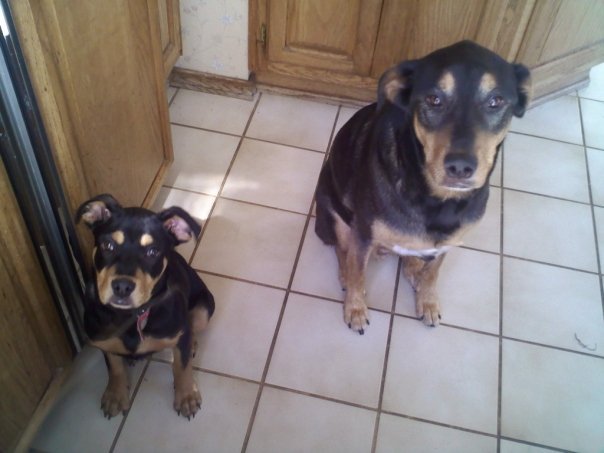 Dominant dog issues
Question
my 2 dogs
I have a 6 year old rottie/shepard m
Dominant dog issues
Question
my 2 dogs
I have a 6 year old rottie/shepard m
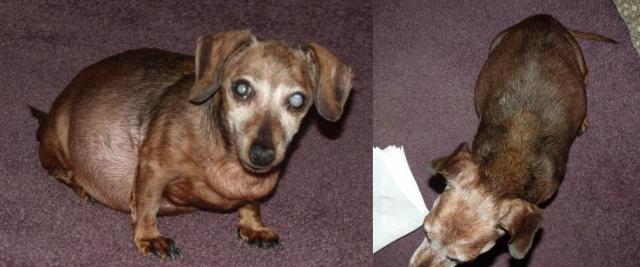 Older dog with distended stomach.
Question
Belle
Hi, my 14 year old miniature dachshund,
Older dog with distended stomach.
Question
Belle
Hi, my 14 year old miniature dachshund,
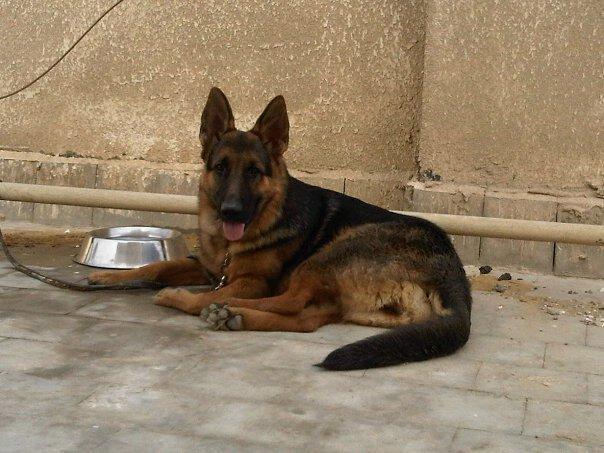 Delayed German Shepherd Heat
QuestionMy German Shepherd
QUESTION: I have a Ge
Delayed German Shepherd Heat
QuestionMy German Shepherd
QUESTION: I have a Ge
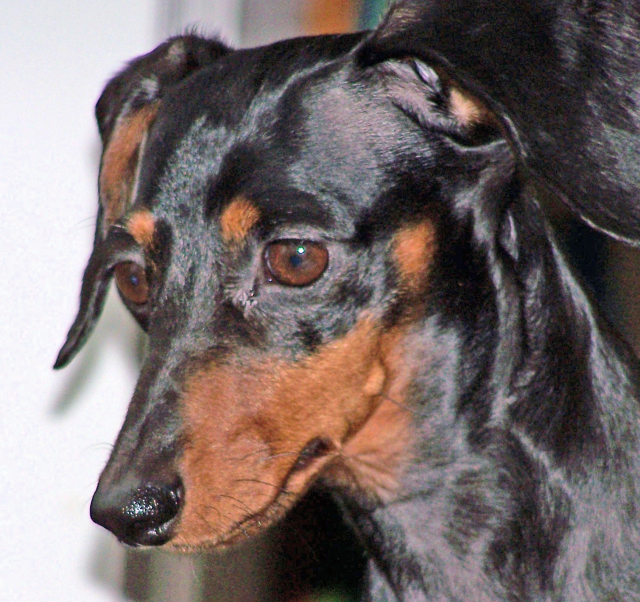 Mini-Daschund Question
Question
Baby
I got a rescus mini about 6 years ago. &n
Mini-Daschund Question
Question
Baby
I got a rescus mini about 6 years ago. &n
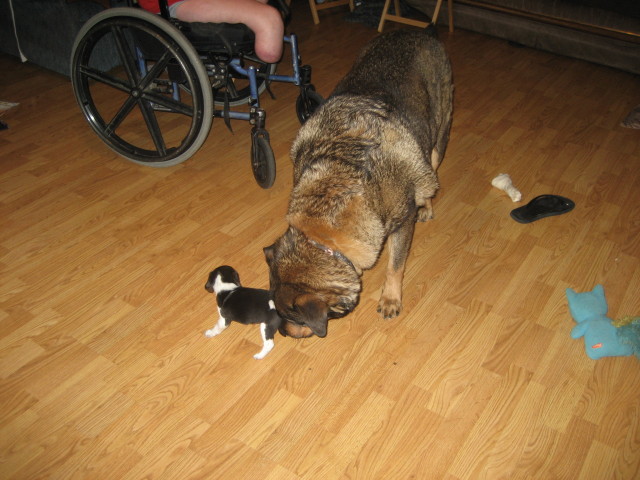 Getting a puppy and dog to get along
Question
RC and Kayleigh
Last Tuesday our dog for 14 ye
Getting a puppy and dog to get along
Question
RC and Kayleigh
Last Tuesday our dog for 14 ye